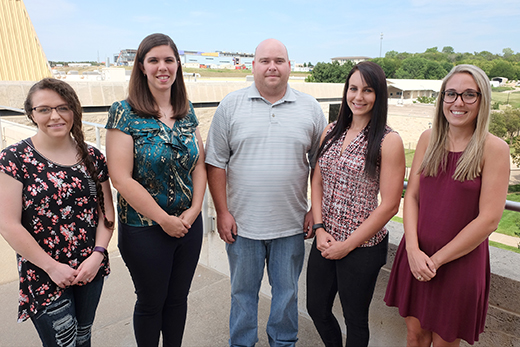University selects first cohort of NBAF Scientist Training Program fellowships funded by $1.6 million federal grant
Wednesday, Aug. 8, 2018

Five Kansas State University students have been awarded National Bio and Agro-defense Facility Scientist Training Program fellowships funded by the U.S. Department of Agriculture's Animal and Plant Health Inspection Service. The fellowship recipients, from left: Kaitlynn Bradshaw, Laura Constance, Chester McDowell, Victoria Ayers and Christian Cook. | Download this photo.
MANHATTAN — When a federal laboratory comes to town, it fuels demand for highly educated and trained workers.
Kansas State University is helping meet that demand. Five graduate students from the College of Veterinary Medicine have been awarded National Bio and Agro-defense Facility Scientist Training Program fellowships. The awardees will receive tuition, stipends and funds for supplies and travel through a $1.6 million cooperative agreement with the U.S. Department of Agriculture's Animal and Plant Health Inspection Service.
Fellowship awardees were selected for their strong interest and expertise in emerging animal diseases, diseases that infect both animals and people, or foreign animal diseases that threaten global health and food security. Once they complete the fellowship program, they are committed to working at the Foreign Animal Disease Diagnostic Laboratory at the Plum Island Animal Disease Center in New York and, ultimately, the National Bio and Agro-defense Facility, or NBAF, which is under construction adjacent to the university's Manhattan campus. The selected students have already received training in high-containment facilities that work with pathogens that will be studied at NBAF.
The fellowship recipients will be mentored by their major professors, with whom they have worked with for at least one to three years, as well with Animal and Plant Health Inspection Service-Foreign Animal Disease Diagnostic Laboratory scientists with subject matter expertise in the identified program areas.
The following students are recipients of the NBAF Scientist Training Program fellowships:
• Kaitlynn Bradshaw, master's student in veterinary biomedical science, Hill City. Her mentor is Sally Davis, assistant professor of diagnostic medicine and pathobiology.
• Chester McDowell, concurrent Doctor of Veterinary Medicine and doctoral student in diagnostic medicine and pathobiology, Corrales, New Mexico. His mentor is Juergen Richt, Regents distinguished professor of diagnostic medicine and pathobiology, Kansas Bioscience Authority eminent scholar and director of the U.S. Department of Homeland Security Center of Excellence for Emerging and Zoonotic Animal Diseases.
• Laura Constance, concurrent Doctor of Veterinary Medicine and doctoral student in diagnostic medicine and pathobiology, Clyde, North Carolina. Her mentors are Bob Rowland, professor, and Megan Niederwerder, assistant professor, both of diagnostic medicine and pathobiology.
• Victoria Ayers, doctoral student in diagnostic medicine and pathobiology, Prague, Oklahoma. Her mentor is Dana Vanlandingham, associate professor of diagnostic medicine and pathobiology.
• Christian Cook, doctoral student in diagnostic medicine and pathobiology, Fort Worth, Texas. Her mentor is Dana Vanlandingham, associate professor of diagnostic medicine and pathobiology.
Beth Montelone, senior associate vice president for research at Kansas State University, said the fellowships are an effort to train future research scientists, veterinarians and research technicians. Other students in the inaugural fellowship class are graduate students at Iowa State University and Mississippi State University. The program will expand next year to include applicants from other universities.
"K-State is very excited to partner with USDA APHIS on training the new generation of front-line researchers on transboundary animal diseases who will be working in the NBAF," Montelone said. "It is a great commentary on the strengths of our research and graduate educational programs that five of our students have been selected to participate in the first cohort of NBAF Scientist Training Program fellowships fellows."
The fellowships provide funding to cover tuition and fees, as well as an annual stipend, health benefits and funds for materials and supplies, travel and publication costs to further their research. A total of five years of funding is available for the concurrent Doctor of Veterinary Medicine and doctoral students; up to four years for doctoral students; and three years for master's-level students.
Carol Shanklin, dean of Kansas State University's Graduate School, said the NBAF Scientist Training Program provides an excellent opportunity for the recipients to gain valuable knowledge and skills while preparing them for scientific careers in national laboratories, including NBAF.
"Preparing graduate students to meet the specialized needs of both U.S. and international workforces is an essential role of graduate education," Shanklin said. "I look forward to working with the five recipients and their mentors to assure the success of the program."
Frank Blecha, associate dean for research at the College of Veterinary Medicine, said the college supports efforts to provide qualified staff for NBAF and other facilities that require agro- and biodefense expertise.
"The NBAF Scientist Training Program fellowship is a career-changing opportunity for selected students," Blecha said. "These students planned their graduate and professional programs to gain research and diagnostic expertise to work on select agents in high-containment facilities with the hope that there would be positions available when they graduate. We are fortunate that USDA APHIS, the university and the college invested in the personnel and infrastructure that will help them reach their goals."
The fellowship opportunities will be offered again in fiscal year 2019. More information about the program is available at k-state.edu/research/opportunities/NSTP.html.
